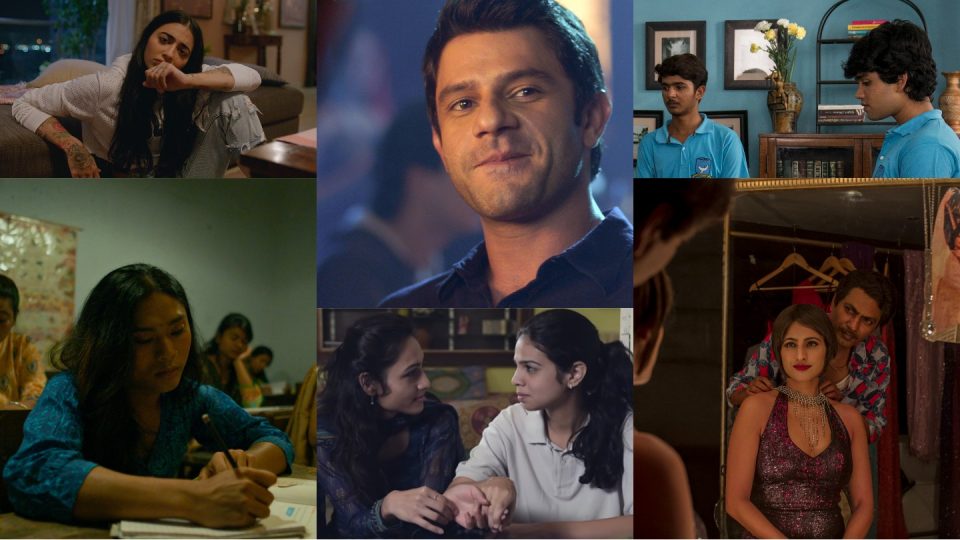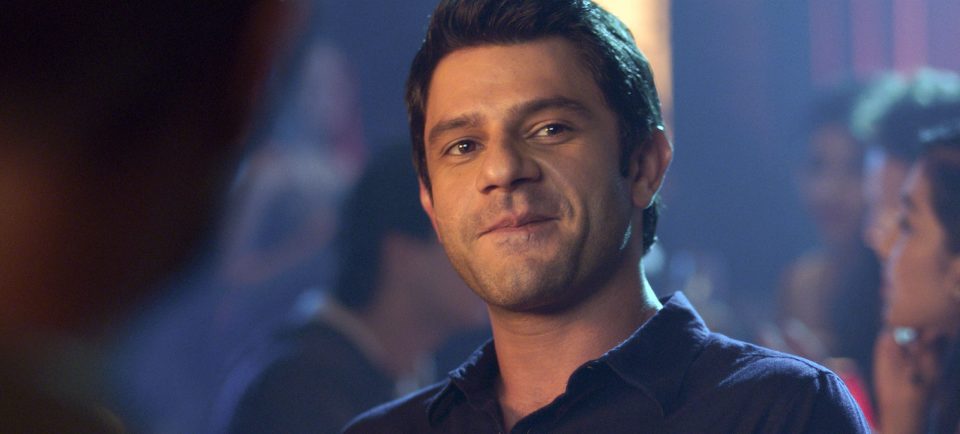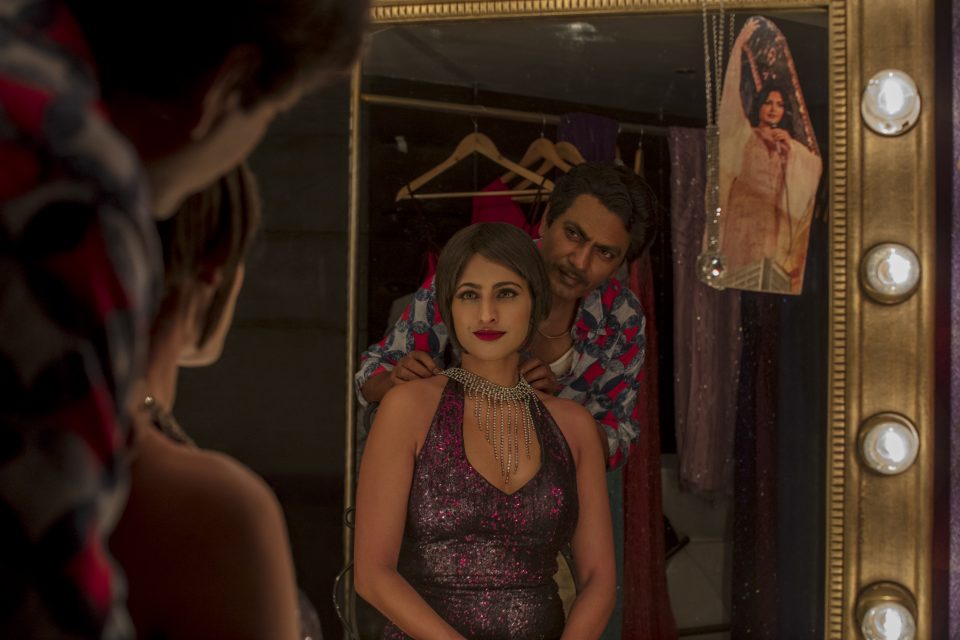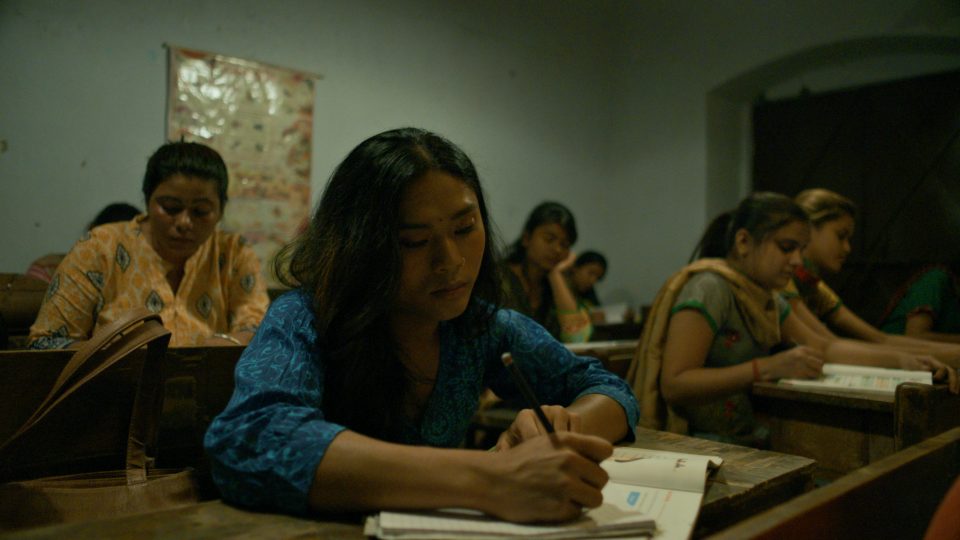Indian LGBTQIA+ Characters Who Started a Conversation
Ditching stereotypes—these roles stood out for a multitude of reasons on streaming platforms

A number of Indian streaming offerings have represented the LGBTQIA+ multitude in recent years. Photo: (clockwise from top left) Amazon Prime Video; Amazon Prime Video; Vaibhav Chaturvedi/Netflix; Ishika Mohan Motwane/Netflix; Screenshot/Justlikethat Films; Amazon Prime Video
From love and acceptance to resistance and revolution, Indian streaming’s offerings brought us a host of characters who heralded a diverse set of conversations. We only hope that creators continue to voice, portray and do justice by the LGBTQIA+ multitude ahead. Here are the characters who stood out to us, setting the ball rolling for layered portrayals in the near and far future:
Umang Singh (Four More Shots Please!)

Bani J as Umang Singh in ‘Four More Shots Please!’. Photo: Amazon Prime Video
Four More Shots Please! debuted as a breezy romantic comedy-drama in 2019 and gave us Indian streaming’s LGBTQIA+ canon couple #Umara (Umang Singh played by Bani J and Samara Kapoor played by Lisa Ray). While the ship itself is contentious, it birthed a beautiful arc for Singh in season two—that of her journey to self-love. In a time when narratives of sexuality often revolve around societal acceptance, Singh undergoes a raw metamorphosis as she comes to terms with her feelings toward her partner and her need for self-expression.
It’s heartbreaking to see her unravel on-screen but Bani J does nuanced justice by Singh trying to hold on to both: a relationship she stands up to the world for, as well as a self she fought tooth and nail to build. As we see her personality shrinking towards the end of the season, it’s a powerful moment of both agency and representation when Singh breaks free from tradition to choose herself.
While Singh’s characterization arguably leaned on the stereotypical depiction of bisexual women in season one, season two subtly took on the issue of bisexual erasure and we saw the character move from a space of having to prove her sexual orientation to simply walking away from the performative, validating her true self. It’s an undoubtedly stellar moment in the series and the hope is that Four More Shots Please! takes on more subversive arcs and digs deeper in its writing for the third act.
Karan Mehra (Made in Heaven)

Arjun Mathur as Karan Mehra in ‘Made In Heaven.’ Photo: Amazon Prime Video
Arjun Mathur played wedding planner Karan Mehra in 2019’s layered drama Made In Heaven. It’s not often that a co-lead in a series isn’t fetishized by the plot because of their sexuality and that’s where Karan Mehra stood out. As Made In Heaven progresses, we see Mehra come to terms with his past trauma and prevailing truth while navigating society, ambition and freedom in New Delhi.
His dynamics particularly with childhood sweetheart Nawab (Vikrant Massey), neighbor Ramesh Gupta (Vinay Pathak) and mother Devyani Mehra (Preeti Mamgain) are an illuminatory look into gender, trauma, tradition, and sexuality in India; particularly how people grapple with their own sense of masculinity versus the idea enforced by patriarchy. As the series gets political, it also dives into exploring the themes of identity, love, freedom and homophobia and Mehra is intricately sketched on screen in the capable hands of Mathur; never a glorified poster boy for the LGBTQIA+ community but a tangible queer character bearing witness to life. Mehra’s sexual identity is also explored from the lens of privilege and we see a very important narrative of privacy unfold in Made In Heaven that eventually concludes in an arc wherein Mehra draws on his privilege as well as disenfranchisement to lobby against India’s draconian Section 377 (which has yet to be read down in the timeline of the show).
As a man standing up to the system, warring with his demons and building his own empire, Mehra is anything but a caricature, setting a great example for how creators should approach and represent LGBTQIA+ characters in their works.
Kukoo (Sacred Games)

Kubbra Sait as Kukoo and Nawazuddin Siddiqui as Ganesh Gaitonde in ‘Sacred Games.’ Photo: Ishika Mohan Motwane/Netflix
Sacred Games debuted in 2018 and made noise for all the right reasons. At the forefront of these was the unassuming character of Kukoo, played with exceptional brilliance by the maverick Kubbra Sait. The transgender woman was a dancer stuck between the worlds of two Mumbai (née Bombay) dons—Ganesh Gaitonde (Nawazuddin Siddiqui) and Suleiman Isa (Saurabh Sachdeva)—and was anything but a wallflower.
Kukoo was indelible for many reasons. She held her own in a world of glitz and violence, commanding respect with every step on the dancefloor and the streets. Her wit was razor-sharp and she held a rawness that translated as both vulnerable and effortlessly real. When people placed bets on who could win Mumbai’s turf war, she knew the best bet was to count on herself.
Kukoo’s relationship with Gaitonde albeit turbulent was a beautiful bond of acceptance and love. It was also ultimately her downfall. Kukoo’s fate was a mainstream wake up call to the mental health emergency amongst transpersons, a situation that’s only worsened by the isolation and stigma that the community continues to face till the present day. Sait’s Kukoo started a conversation beyond the representation of sexual identity and gender orientation on-screen, tackling the very real elephant of access for the trans community, to their rights as citizens as well as inclusive mental and physical health care.
While the character and Sait’s portrayal of a transgender woman were praised, it also led to the trans community—and viewers at large in India—voicing their disappointment about a cisgender actor being cast for the role. It resulted in a much-needed discussion about the gap in opportunities for trans persons in the entertainment industry, particularly to represent themselves on-screen. When asked about the casting by The Telegraph and India Today, Sait acknowledged the gap while relating a conversation she had with series director Anurag Kashyap who maintained that transpersons were auditioned for the role but that none wanted to play a trans person on-screen or reveal that they aren’t cisgender actors. While the actors’ reasons are unknown, the onus is on the industry to create a safe and inclusive space for creatives of all gender identities to have access to equal opportunity, thereby—to some extent—breaking the valid fear trans actors hold of being typecast.
Aachal and Aadya (The ‘Other’ Love Story)

Shweta Gupta as Aachal and Spoorthi Gumaste as Aadya in ‘The ‘Other’ Love Story.’ Photo: Screenshot/Justlikethat Films
The ‘Other’ Love Story dropped in 2016 and charted a beautiful portrait of two lovers at the turn of the 20th century. The series unfolds between 1998 and 2001 wherein we meet Aachal (Shweta Gupta) and Aadya (Spoorthi Gumaste), two unassuming women who start out as relative strangers before falling irrevocably in love in Bengaluru (née Bangalore). There’s an inherent simplicity and groundedness with which the series approaches the women, mirroring the abandon and anxieties of the times as well as the rush of serotonin accompanying first love.
Both college students, their lives are marked by the passing of bunked lectures and meals shared at the canteen, bus rides in each other’s company and home visits that pass under the ruse of studies. In The ‘Other’ Love Story, Aachal and Aadya’s romance effortlessly mingles with their coming-of-age. They are bound neither by timeline nor template as they navigate the mundane struggles of student life and the strictures of their familial ties. There’s an inherent innocence to Aachal and Aadya’s exploration of friendship, love and sex; where fears are spoken as loudly as desire and acceptance. They’re each others’ safe space and there’s a remarkable strength in how they reveal their vulnerabilities and stand up for each other.
Aachal and Aadya also embody everyday women, they feel like friends we’ve met before, the people we have been and are; rarely translating as figments of fiction in the series. Their resistance to rejection is subdued but speaks volumes as they skirt tradition to form covenants of their own; time and distance a daunting but pointless variable. In this image of late Nineties Bangalore, Aachal and Aadya are a timeless portrait of love that doesn’t need anyone’s permission but theirs to be.
Manju Kumar and Javed Ansari (Selection Day)

Mohammad Samad as Manju Kumar and Karanvir Malhorta as Javed Ansari in ‘Selection Day.’ Photo: Vaibhav Chaturvedi/Netflix
Selection Day opens and we’re expecting a story of grit, camaraderie and competition between sportspersons. Somewhere we’re also anticipating an underdog arc and rags to riches trope in the mix. Some toxic rivalry too—because let’s be real, it’s what we’ve come to expect from sporting narratives. What’s unexpected if you haven’t read Aravind Adiga’s namesake 2016 novel (the source adapted by the 2018 Netflix series) is the evolving dynamic between team players Manjunath aka Manju Kumar (Mohammad Samad) and Javed Ansari (Karanvir Malhotra).
What really stands out are the exchanges between the two teenage boys from the fictional Weinberg Academy’s cricketing team. From the barrage of insults and a life-saving act to the tenderness of a written poem as well as a bond that refuses to fray; Selection Day neither charts an arc of either character coming out, nor confirms the boys’ sexuality. The series instead, through many moments, allows Kumar and Ansari to assert and explore their inexplicable draw towards each other, that in spite of their many divides (class, religion, ambition) pulls them inextricably together right till the psychologically problematic mess of a question mark end.
Unrequited romance is difficult to portray with nuance and even harder to come by in mainstream offerings exploring queer narratives, but Selection Day manages to establish a healthy dynamic between Kumar and Ansari sensitively. Kumar outwardly rejects Ansari’s feelings (conveyed through the poem) without rejecting Ansari himself, respecting the space from where Ansari shared the note. As the series progresses, there’s a lot of opposition to their unlikely bond and it’s beautiful to see the two boys stick it out by each other as they grow to know themselves and the other better; even as feelings half-answered and partially comprehended simmer between the two. There’s time and they allow themselves the luxury to let it pass while they tend to the urgencies that drive their lives. It’s refreshing to see young people just leave some cares be.
Mary Lyngdoh (Paatal Lok)

Mairembam Ronaldo Singh as Mary Lyngdoh aka Cheeni in ‘Paatal Lok.’ Photo: Amazon Prime Video
Paatal Lok’s Mary Lyngdoh aka Cheeni (Mairembam Ronaldo Singh) is a woman who is as much at necessitated war with the state as she is at peace with herself. Notably played by a transgender woman herself (Singh makes her debut in this year’s breakout series), Cheeni is a mirror to the brutality, discrimination and rejection that trans and homeless persons often find themselves facing in India and Singh navigates her character’s ambition and choices with a rending rawness and steely innocence as Paatal Lok unfolds.
We see Cheeni face discrimination on two important fronts in the series: ethnicity and gender. While she bears the brunt of slurs that are used to both misgender and shame her, she’s also attacked with words steeped in racial stereotyping and scrutiny. Cheeni also survives a childhood marred by sexual violence and an adulthood marked by police brutality as she tries to prove her innocence in the investigation at the heart of the series. In an India post the 2019 Transgender Persons Act (which drew widespread criticism from activists for being vague and discriminatory), Cheeni is mainstream testimony to an identity that is nowhere close to being safeguarded by the state.
While her character seems inextricable from Paatal Lok’s violent realities, there are moments in the series where we see Cheeni the way she views herself; these moments though few are powerful markers of Cheeni’s inherent freedom and identity as a woman. The love she shares with childhood mate Kaaliya (Amarjeet Singh) is a reprieve from the stereotypes that plague trans persons in mainstream offerings, as are her educational and professional trajectories that she hopes grant her further agency. Cheeni isn’t reduced to a single act; she is a multitude pieced intricately over the course of the 9-episode series and as Paatal Lok closes, there’s little doubt Cheeni is a survivor. The question though—among countless others—is why do we enable a world where she has to fight to simply be?



